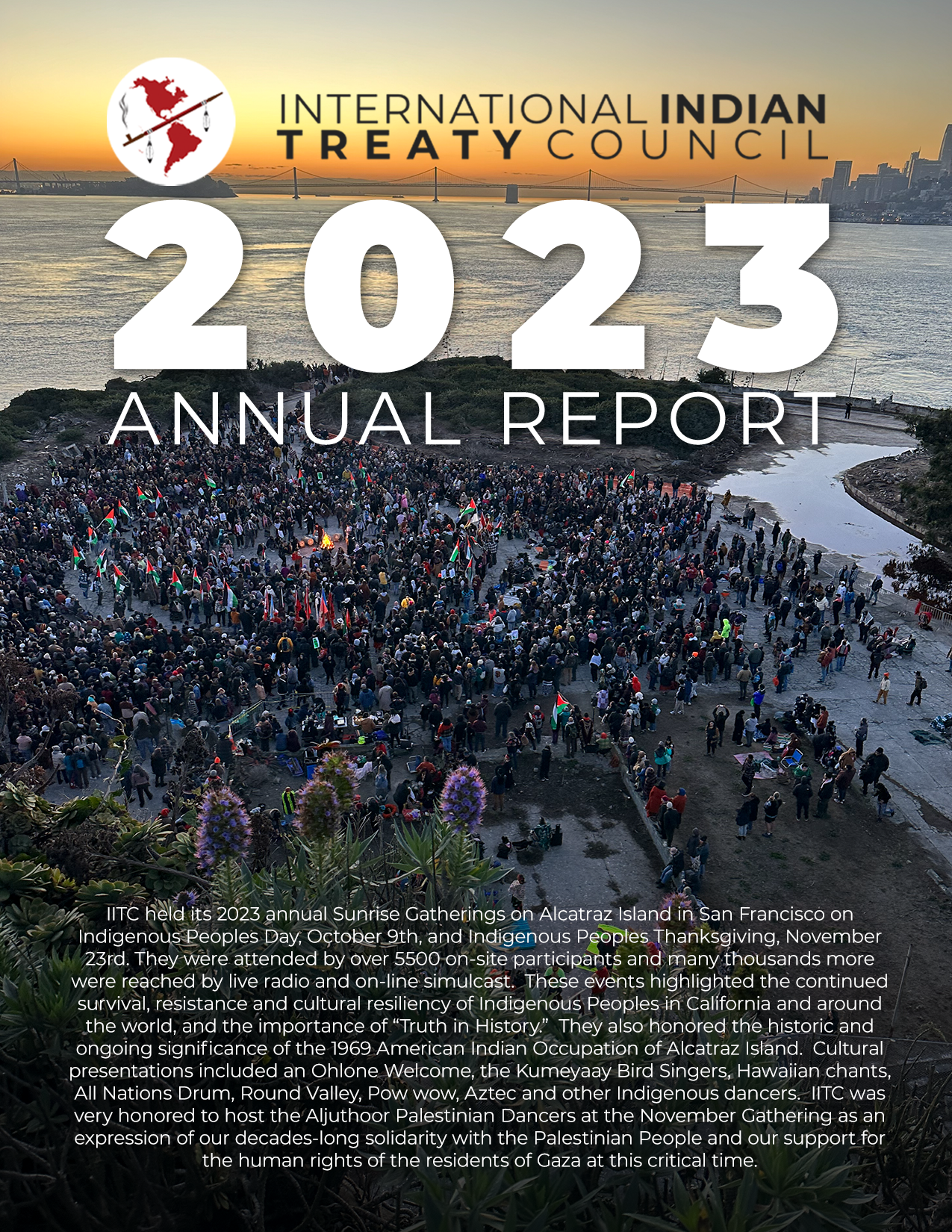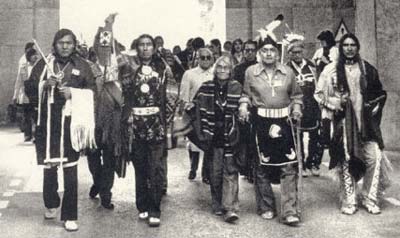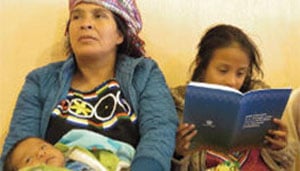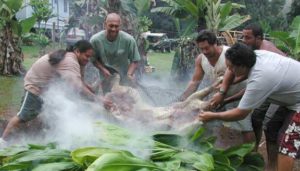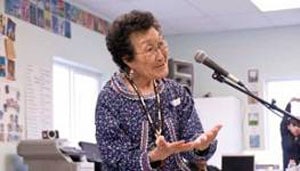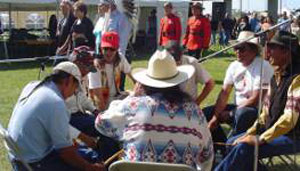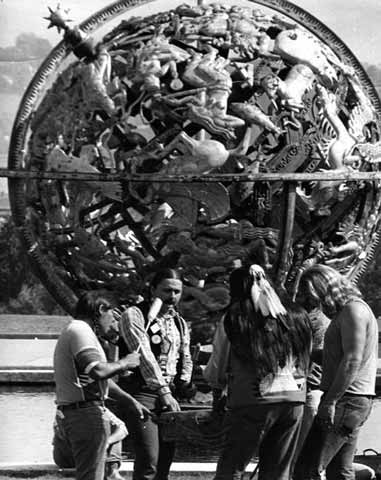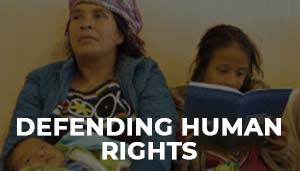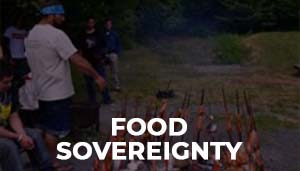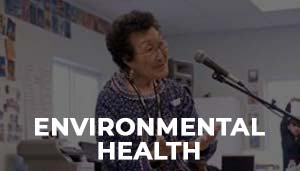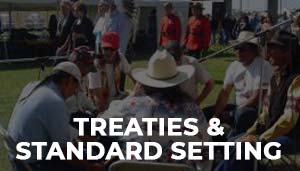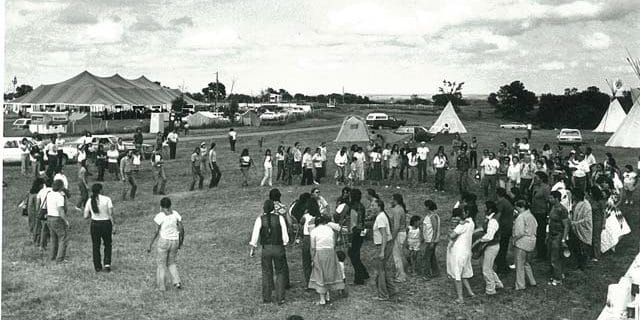Looking Ahead to CBD COP 15 in Montreal: IITC and COICA continue
to affirm their support for the recommendations of 3 UN Expert
Bodies addressing the Rights of Indigenous Peoples and the matter
of “Local Communities
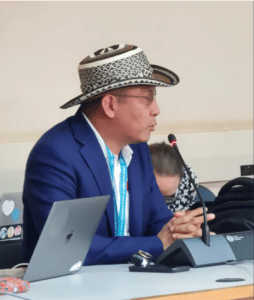
UN Permanent Forum President Dario Mejia, addressed the International Indigenous Peoples Forum on Biodiversity during the Open-Ended Working Group session in Nairobi, June 23, 2022
On June 25, 2022, at the conclusion of the 4th meeting of the Open-ended Working Group on the Post-2020 Global Biodiversity Framework, Nairobi Kenya, the International Indian Treaty Council (IITC) presented a statement raising serious concerns regarding the continued conflation of Indigenous Peoples and “local communities” during this session. IITC’s statement was also endorsed formally by the Coordination of Indigenous Organizations of the Amazon River Basin (COICA). IITC represents several hundred Indigenous Peoples, Nations, governments, organizations and councils from North, Central and South America, the Pacific and Caribbean. COICA represents more than 500 distinct Indigenous Peoples from 9 countries in South America.
IITC’s and COICA’s statement expressed full support for the recommendations on this matter of three UN bodies focused on the implementation of the distinct rights affirmed in the United Nations Declaration on the Rights of Indigenous Peoples: the UN Permanent Forum on Indigenous Issues, the UN Special Rapporteur on the Rights of Indigenous Peoples and the UN Expert Mechanism on the Rights of Indigenous Peoples.
These recommendations call attention to the negative impacts on the realization and guarantee of Indigenous Peoples’ rights caused by combining, equating and conflating Indigenous Peoples and “local communities” into an undefined entity called “IPLC” at the CBD and other UN bodies. Rights to self-determination, lands and territories, Free Prior and Informed Consent and other inherent rights that are recognized specifically for Indigenous Peoples are presented as applying to this “IPLC” entity, negatively impacting the ability of Indigenous Peoples to assert these rights in struggles “on the ground” in various countries. For example, some countries have supported miners and other private enterprises being designated as “local communities” with rights to encroach into Indigenous Peoples’ lands.
Most recently, the UNPFII’s recommendation in paragraph 85 of the report on its 21st session (April 25 – May 6, 2022) states in part that “Indigenous peoples have been a distinct constituency at the United Nations since 1977 and, with the adoption of the United Nations Declaration on the Rights of Indigenous Peoples by the General Assembly in 2007, their inherent rights were affirmed as the international minimum standard. The Permanent Forum reiterates the position of the Special Rapporteur on the rights of indigenous peoples, namely that it is unacceptable to undermine the status and standing of indigenous peoples by combining or equating them with non-indigenous entities such as minorities, vulnerable groups or local communities”.
The IITC and COICA will continue to support this position at the second session of the 15th UN Convention on Biological Diversity Conference of the Parties (CBD COP15), which will take place in Montreal Canada from December 5-17, 2022. IITC and COICA will continue to urge the CBD and its Post-2020 Biodiversity Framework to reject attempts to combine and equate Indigenous Peoples and “local communities”. We encourage the CBD, the UN Framework Convention on Climate Change (UNFCCC), the Minamata Convention and other UN bodies to instead create separate processes and structures for self-identified, self-defined “local communities” to participate in these processes.
Finally, we reaffirm that the protection and restoration of the world’s biodiversity will only be achieved through the full recognition of all the rights of Indigenous Peoples, especially to their lands, territories and natural resources. IITC and COICA will continue our active participation in the CBD process towards the realization of this essential goal.
For the text of IITC’s and COCIA’s statement, which includes the recommendations of the three UN bodies mentioned above in full, click here.
For more information contact: Juan Leon Alvarado, [email protected] (IITC, Spanish),
Rochelle Diver, [email protected] (IITC, English), Harol Rincon Ipuchima (COICA, Spanish),
[email protected] or David Flórez Valencia, [email protected] (COICA, Spanish or English)
Share this post
Looking Ahead to CBD COP 15 in Montreal
Looking Ahead to CBD COP 15 in Montreal: IITC and COICA continue
to affirm their support for the recommendations of 3 UN Expert
Bodies addressing the Rights of Indigenous Peoples and the matter
of “Local Communities

UN Permanent Forum President Dario Mejia, addressed the International Indigenous Peoples Forum on Biodiversity during the Open-Ended Working Group session in Nairobi, June 23, 2022
On June 25, 2022, at the conclusion of the 4th meeting of the Open-ended Working Group on the Post-2020 Global Biodiversity Framework, Nairobi Kenya, the International Indian Treaty Council (IITC) presented a statement raising serious concerns regarding the continued conflation of Indigenous Peoples and “local communities” during this session. IITC’s statement was also endorsed formally by the Coordination of Indigenous Organizations of the Amazon River Basin (COICA). IITC represents several hundred Indigenous Peoples, Nations, governments, organizations and councils from North, Central and South America, the Pacific and Caribbean. COICA represents more than 500 distinct Indigenous Peoples from 9 countries in South America.
IITC’s and COICA’s statement expressed full support for the recommendations on this matter of three UN bodies focused on the implementation of the distinct rights affirmed in the United Nations Declaration on the Rights of Indigenous Peoples: the UN Permanent Forum on Indigenous Issues, the UN Special Rapporteur on the Rights of Indigenous Peoples and the UN Expert Mechanism on the Rights of Indigenous Peoples.
These recommendations call attention to the negative impacts on the realization and guarantee of Indigenous Peoples’ rights caused by combining, equating and conflating Indigenous Peoples and “local communities” into an undefined entity called “IPLC” at the CBD and other UN bodies. Rights to self-determination, lands and territories, Free Prior and Informed Consent and other inherent rights that are recognized specifically for Indigenous Peoples are presented as applying to this “IPLC” entity, negatively impacting the ability of Indigenous Peoples to assert these rights in struggles “on the ground” in various countries. For example, some countries have supported miners and other private enterprises being designated as “local communities” with rights to encroach into Indigenous Peoples’ lands.
Most recently, the UNPFII’s recommendation in paragraph 85 of the report on its 21st session (April 25 – May 6, 2022) states in part that “Indigenous peoples have been a distinct constituency at the United Nations since 1977 and, with the adoption of the United Nations Declaration on the Rights of Indigenous Peoples by the General Assembly in 2007, their inherent rights were affirmed as the international minimum standard. The Permanent Forum reiterates the position of the Special Rapporteur on the rights of indigenous peoples, namely that it is unacceptable to undermine the status and standing of indigenous peoples by combining or equating them with non-indigenous entities such as minorities, vulnerable groups or local communities”.
The IITC and COICA will continue to support this position at the second session of the 15th UN Convention on Biological Diversity Conference of the Parties (CBD COP15), which will take place in Montreal Canada from December 5-17, 2022. IITC and COICA will continue to urge the CBD and its Post-2020 Biodiversity Framework to reject attempts to combine and equate Indigenous Peoples and “local communities”. We encourage the CBD, the UN Framework Convention on Climate Change (UNFCCC), the Minamata Convention and other UN bodies to instead create separate processes and structures for self-identified, self-defined “local communities” to participate in these processes.
Finally, we reaffirm that the protection and restoration of the world’s biodiversity will only be achieved through the full recognition of all the rights of Indigenous Peoples, especially to their lands, territories and natural resources. IITC and COICA will continue our active participation in the CBD process towards the realization of this essential goal.
For the text of IITC’s and COCIA’s statement, which includes the recommendations of the three UN bodies mentioned above in full, click here.
For more information contact: Juan Leon Alvarado, [email protected] (IITC, Spanish),
Rochelle Diver, [email protected] (IITC, English), Harol Rincon Ipuchima (COICA, Spanish),
[email protected] or David Flórez Valencia, [email protected] (COICA, Spanish or English)
